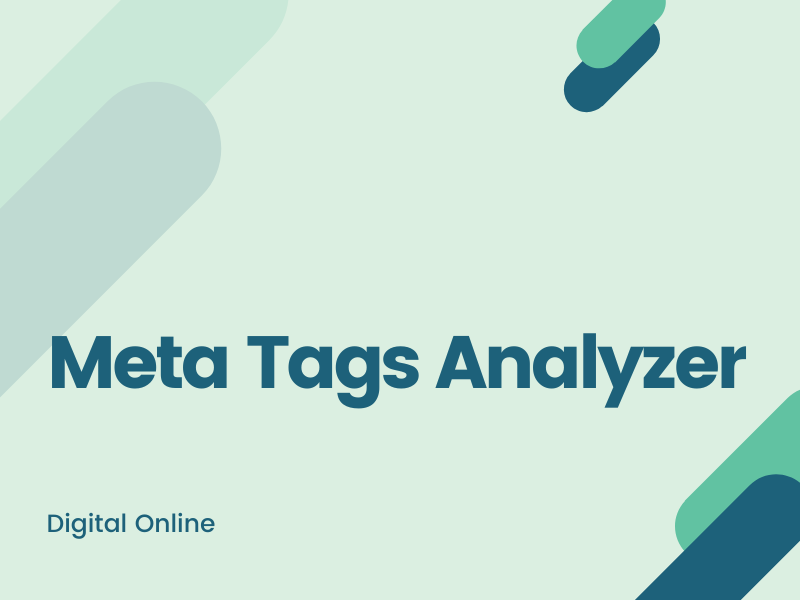Common Mistakes to Avoid When Using an SEO Meta Tags Analyzer
1. Not including all relevant meta tags: It is important to include all relevant meta tags when using an SEO meta tags analyzer. This includes title tags, meta descriptions, and meta keywords. Failing to include all of these tags can lead to inaccurate results. https://www.digital-online.tools
2. Not using the correct keywords: When using an SEO meta tags analyzer, it is important to use the correct keywords. Using keywords that are not relevant to the content of the page can lead to inaccurate results.
3. Not optimizing the meta tags: It is important to optimize the meta tags for the best results. This includes using the correct keywords, writing a compelling meta description, and ensuring that the title tag is concise and descriptive.
4. Not using the latest version of the analyzer: It is important to use the latest version of the SEO meta tags analyzer. Using an outdated version can lead to inaccurate results.
5. Not checking the results: It is important to check the results of the SEO meta tags analyzer to ensure that the tags are optimized correctly. Failing to do so can lead to inaccurate results.
Tips for Optimizing Your SEO Meta Tags for Maximum Visibility
1. Use Keywords Strategically: When creating your SEO meta tags, it is important to use keywords that are relevant to your content and that are likely to be searched by your target audience. This will help ensure that your content is visible to the right people.
2. Keep It Short and Sweet: SEO meta tags should be concise and to the point. Aim for no more than 160 characters, as anything longer may be truncated in search engine results.
3. Include Your Brand Name: Including your brand name in your SEO meta tags can help to increase visibility and recognition.
4. Use Unique Tags for Each Page: Each page of your website should have its own unique SEO meta tags. This will help search engines to better understand the content of each page and will help to ensure that the right people are seeing the right content.
5. Use Structured Data: Structured data, such as schema markup, can help to provide additional information to search engines about your content. This can help to improve visibility and click-through rates.
6. Monitor Your Results: Regularly monitoring your SEO meta tags can help you to identify any areas that need improvement. This can help to ensure that your content is as visible as possible.
Understanding the Different Types of SEO Meta Tags and How to Use Them
Search engine optimization (SEO) is an important part of any website’s success. One of the most important aspects of SEO is the use of meta tags. Meta tags are snippets of code that provide search engines with information about a website’s content. By using the right meta tags, you can help ensure that your website is properly indexed and ranked by search engines.
There are several different types of meta tags that can be used to optimize a website. The most common type of meta tag is the title tag. This tag is used to provide a brief description of the page’s content. It should be kept to a maximum of 60 characters and should include the primary keyword for the page.
The meta description tag is another important meta tag. This tag is used to provide a brief summary of the page’s content. It should be kept to a maximum of 160 characters and should include the primary keyword for the page.
The meta keywords tag is used to provide a list of keywords that are related to the page’s content. This tag should include a list of relevant keywords that are separated by commas.
The meta robots tag is used to provide instructions to search engine crawlers. This tag can be used to tell search engines to index or not index a page, as well as to follow or not follow any links on the page.
The meta viewport tag is used to control how a page is displayed on mobile devices. This tag can be used to set the width and height of the page, as well as to control the scaling of the page.
Finally, the meta refresh tag is used to redirect visitors to a different page. This tag can be used to redirect visitors to a different page after a certain amount of time has passed.
By using the right meta tags, you can help ensure that your website is properly indexed and ranked by search engines. It is important to use the right meta tags for each page on your website in order to maximize your SEO efforts.
The Benefits of Using an SEO Meta Tags Analyzer for Your Website
An SEO meta tags analyzer is a powerful tool for website owners and marketers to optimize their website for search engine rankings. By analyzing the meta tags of a website, the analyzer can provide valuable insights into how the website is performing in terms of SEO. This can help website owners and marketers to identify areas of improvement and make changes to their website to improve its visibility and ranking in search engine results.
Using an SEO meta tags analyzer can provide website owners and marketers with a comprehensive view of their website’s performance. The analyzer can provide detailed information about the meta tags used on the website, including the title, description, and keywords. This information can be used to identify areas of improvement and make changes to the website to improve its visibility and ranking in search engine results.
The analyzer can also provide website owners and marketers with an understanding of how their website is performing in terms of SEO. By analyzing the meta tags of a website, the analyzer can provide insights into how the website is performing in terms of SEO. This can help website owners and marketers to identify areas of improvement and make changes to their website to improve its visibility and ranking in search engine results.
Using an SEO meta tags analyzer can also help website owners and marketers to identify potential problems with their website. By analyzing the meta tags of a website, the analyzer can provide insights into potential issues that may be affecting the website’s performance in terms of SEO. This can help website owners and marketers to identify areas of improvement and make changes to their website to improve its visibility and ranking in search engine results.
Overall, using an SEO meta tags analyzer can provide website owners and marketers with a comprehensive view of their website’s performance. By analyzing the meta tags of a website, the analyzer can provide valuable insights into how the website is performing in terms of SEO. This can help website owners and marketers to identify areas of improvement and make changes to their website to improve its visibility and ranking in search engine results.
How to Use an SEO Meta Tags Analyzer to Improve Your Website Rankings
Search engine optimization (SEO) is an important part of any website’s success. One of the most important aspects of SEO is the use of meta tags. Meta tags are snippets of code that provide search engines with information about the content of a website. An SEO meta tags analyzer is a tool that can help you optimize your website’s meta tags for better search engine rankings.
Using an SEO meta tags analyzer is simple. First, enter the URL of the page you want to analyze. The analyzer will then scan the page and provide you with a report of the meta tags used on the page. This report will include the meta tags that are present, as well as any errors or warnings that may be present.
Once you have the report, you can begin to optimize your meta tags. Start by looking for any errors or warnings that the analyzer has identified. If any errors or warnings are present, you should address them immediately. This could involve correcting any typos or making sure that the meta tags are properly formatted.
Next, look for any meta tags that are missing. If any important meta tags are missing, you should add them to the page. This could include meta tags such as the page title, description, and keywords. Make sure that the meta tags are relevant to the content of the page and that they are properly formatted.
Finally, you should review the meta tags that are already present on the page. Make sure that the meta tags are relevant to the content of the page and that they are properly formatted. If any of the meta tags are outdated or irrelevant, you should update them or remove them.
By using an SEO meta tags analyzer, you can ensure that your website is properly optimized for search engine rankings. This can help you improve your website’s visibility and rankings in search engine results pages.

